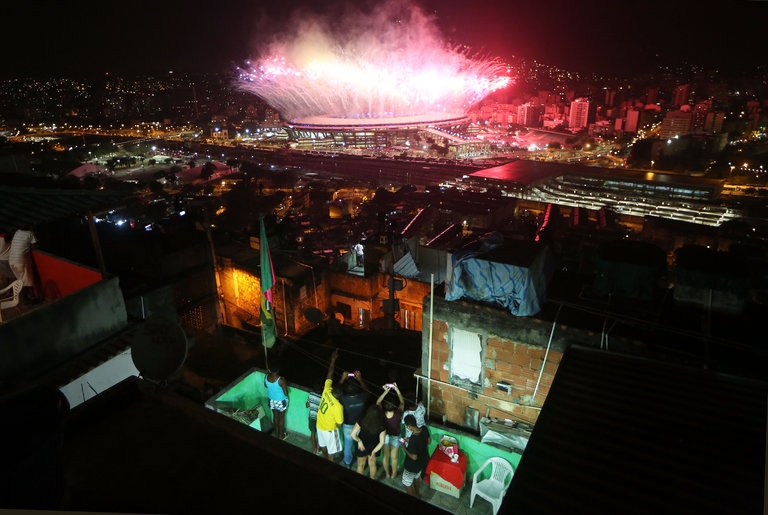
People in a nearby favela watched fireworks exploding during the opening ceremonies of the Rio 2016 Olympic Games. Credit Mario Tama/Getty Image
The New York Times
August 21st, 2016
by Vanessa Barbara
Contributing Op-Ed Writer
RIO DE JANEIRO — I thought of beginning this column by praising Brazil’s friendly and open-minded people, the natural beauty of our landscape and the supreme delight that are Globo biscuits. But perhaps sarcasm isn’t the best response to those who blame me for writing only bad things about my country, ruining the image of our beloved land of samba and caipirinhas.
People tell me I’ve been overly critical about our problems. They claim you should “never wash your dirty linen in public,” and that it would be better just to say positive things about Brazil.
After I wrote a recent article criticizing many aspects of the preparation for the Olympics, I was overwhelmed by patriotic outrage. On Twitter, the mayor of Rio de Janeiro implied that I was jealous because I live in São Paulo and the Games are being held in Rio. A journalist suggested I was rooting against the Olympics and the host city. An artist sent me an email to say I was just writing what Americans wanted to read — in other words, that I was being subservient to the suspicious purposes of the foreign media. One Twitter user deemed me “intolerable, arrogant, far-fetched and maliciously pessimistic.”
There is a perception here that only foreigners are criticizing Rio 2016, and that they are doing so because they are rooting against our country’s success. It seems everything has become a matter of sports: you are either with us or against us. This month, when an article in The New York Times criticized Rio’s culinary tradition and mocked Globo biscuits as “basically an oversize Funyun,” Brazilians’ were close to demanding the rupture of diplomatic relations.
Then there was the “robbery” incident with the four American swimmers, which made the atmosphere even more charged. The story was quickly spread as a cautionary tale about crime in Rio, but turned on itself as it gradually emerged that many points in Ryan Lochte’s account had been fabricated. The episode still needs to be clarified, but it has already provoked outcries against unfair treatment in the media and prejudice against the Global South.
Some have said I’ve “predicted” that Rio 2016 would be a catastrophe. Soon after the opening ceremony, which was praised internationally, people implied I should start worrying about my prognosis. But I’m no fortuneteller: I asserted that the Olympics were already a public calamity for many citizens, especially for those affected by the evictions, by police brutality and by the anti-democratic shakedown of an unequal and segregated city. A beautiful opening ceremony and 16 days of sports competitions without any cataclysm don’t count as a triumph when there are two questions that remain unanswered: Success for whom? And at what cost?
As a way of dismissing the criticism, Brazilians sometimes resort to a principle called complexo de vira-latas, or mutt complex, a metaphor created by the writer Nelson Rodrigues to portray the inferiority in which we voluntarily place ourselves in front of the rest of the world. “The Brazilian is a Narcissus inside out who spits in his own image,” Mr. Rodrigues wrote, noting that we usually don’t find personal or historical pretexts for a high self-esteem. I’m accused of having a mutt complex every time I write about Brazil’s inequality, housing deficit, racism, misogyny and police brutality.
On the other hand, it seems Brazil’s patriotic advocates ignore the mutt complex and go straight to a blind megalomania. They repudiate any criticism, yelling, “In your face!” like angry soccer fans at those who dare to say anything that isn’t stereotypically optimistic or joyful.
The result is the following: Brazilians boo every athlete who’s not Brazilian, we boo the foreign journalists and we boo ourselves, just for the noise. Yet, many of us are interested only in making a good impression on the same foreigners we seem to despise; we want the country to look pretty on camera, despite the cost for those who live here. Every positive article about the Olympics in the international press is like a gold medal.
For me, this is a more serious complex: the one where you will do anything just to impress the visitors and try to disguise problems, instead of fixing them.
Even if I’m accused of being in league with our adversaries, I think we should talk about the wall that was built alongside the road from Rio’s international airport to cover the view of the favelas. We have to demand that all costs involved in the Olympics’ preparation are divulged and duly accounted for, which is still far from happening. We cannot forget the thousands of families evicted to make way for Olympic venues, including the Olympic Village, which will be eventually converted to high-end condominiums. We must keep asking for more transportation infrastructure, for lines that extend beyond the scenic, central routes connecting the Olympic venues.
After the final ceremonies, when the last fireworks have been launched and all the foreign journalists have returned home, a bankrupt state of Rio will be left to pick up the pieces. And neither patriotism nor the love of sports will entitle us to overlook our reality.

